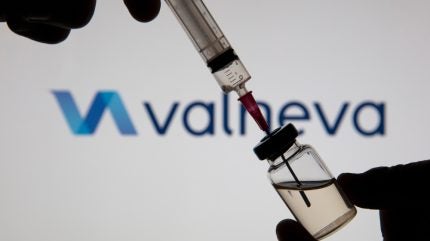
The US Food and Drug Administration (FDA) has suspended the licence for Valneva’s chikungunya vaccine Ixchiq, just two weeks after lifting a partial pause on the jab’s use after investigating safety concerns.
The U-turn by the FDA comes amid new reports of serious adverse events (SAEs) in individuals administered with Ixchiq.

Discover B2B Marketing That Performs
Combine business intelligence and editorial excellence to reach engaged professionals across 36 leading media platforms.
Shares in Paris-listed Valneva were trading 25.5% down compared to market open on 22 August, the day the FDA issued its decision after market close.
The agency stated its verdict, made via the Center for Biologics Evaluation and Research (CBER), is “based on serious safety concerns related to the vaccine, which appears to be causing chikungunya-like illness in vaccine recipients”.
The agency cited reports of 21 hospitalisations and three deaths linked to the vaccine. This includes one death from encephalitis directly attributable to the vaccine.
The CBER said its benefit-risk is no longer in favour of the drug under most plausible scenarios. The FDA department said it therefore “believes this vaccine is not safe” and that “continued administration to the public would pose a danger to health”.

US Tariffs are shifting - will you react or anticipate?
Don’t let policy changes catch you off guard. Stay proactive with real-time data and expert analysis.
By GlobalDataThe decision to revoke the vaccine’s licence means it can no longer be used in the US. In a statement, Valneva said it is now mandated to stop shipping and selling Ixchiq in the country.
“Valneva is committed to upholding the highest safety standards and will continue to engage proactively with health authorities in all territories where Ixchiq is licensed,” the French vaccine specialist added in its statement.
Adding more clarity to the safety events, Valneva highlighted that three of the four deaths – all of which occurred outside the US – occurred in elderly patients.
The company stated: “Valneva believes all cases describe symptoms consistent with those previously reported during clinical trials and post-marketing experience, particularly among the elderly individuals for whom the vaccine’s Prescribing Information (PI) includes warnings and precautions.”
Valneva’s CEO Thomas Lingelbach confirmed that Ixchiq will still be sold in all countries where the product is licensed.
Ixchiq contributed €7.5m to Valneva’s €91m total product sales in H1 2025. The company says it is currently evaluating the financial impact of the US suspension.
In an email to Pharmaceutical Technology, a Valneva spokesperson said the company is “continuing to investigate these cases in detail and if warranted will pursue further steps in connection with FDA’s decision in accordance with applicable statutory procedures.”
The shot’s ban in the US is the latest undulation in a rocky regulatory road Ixchiq has traversed in the past month. In May 2025, the FDA and the US Centers for Disease Control and Prevention (CDC) jointly recommended a pause in the vaccine’s use in those aged 60 and over after post-marketing reports of serious adverse events. However, this partial pause was lifted on 8 August after the FDA reevaluated the vaccine’s benefit-risk profile as part of its investigation.
The FDA suspension of Ixchiq’s licence leaves Bavarian Nordic’s Vimkunya as the sole chikungunya vaccine approved in the US. Unlike Ixchiq, which was only approved for adults, Vimkunya is licensed for immunisation in those aged 12 years and above.
It is unclear whether the European Medicines Agency (EMA), which has made similar decisions to the FDA in the past month regarding Ixchiq, will also, in turn, suspend marketing authorisation.
Caused by its namesake virus, chikungunya is a mosquito-borne disease mainly found in tropical regions. Although cases are not prevalent in North America or Europe, there is a risk of disease transmission to travellers visiting outbreak-affected countries in Africa and South America, along with islands in the Indian and Pacific Oceans.
Indeed, the CDC has issued a considerable number of chikungunya-related travel alerts amid a new wave of outbreaks in countries, including China, Kenya, and Bolivia.
The CBER reversals with Ixchiq mirror similar decisions with Sarepta’s gene therapy Elevidys in July.
Even the agency’s director Vinay Prasad was involved in a reversal. Prasad stepped down from his role as CBER director in late July, only to rejoin the department in the same role two weeks later.




